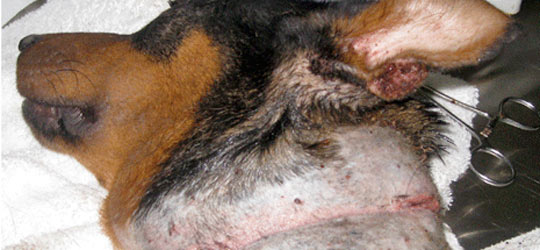 We apologise if this image causes you any distress. But we print this today because it is an example of animal cruelty occurring more frequently on Grand Bahama.
We apologise if this image causes you any distress. But we print this today because it is an example of animal cruelty occurring more frequently on Grand Bahama.
If it shocks, and brings about a change in the way we treat our pets, then this dog’s suffering will not have been in vain,
Officials at the Humane Society of Grand Bahama (HSGB) say there has been a significant increase in the number of dogs who are being chained and caged, and far too many others are still living lonely, often abused and neglected, on the streets. Chained and or caged dogs are much more likely to suffer embedded collars, starvation, heat exhaustion or stroke, and they are also at a high risk of being injured from a tangled chain or rope.
Many have died from self-strangulation.
They are forced to live, sleep and eat in the same areas they must eliminate in and are unable to clean up after themselves.
Tip Burrows, executive director at the Humane Society of Grand Bahama, expressed her extreme concern for dogs that are caged or chained.
She said: “Dog owners always have what they think is a good reason for putting them on a chain or in a cage. The simple fact is, there simply is no good reason.”
Burrows explained that depriving dogs from the very thing they crave most which is love and companionship is detrimental to their health.
“When dogs are neglected, they become stressed due to the obvious physical discomforts and cruelty. This causes them to become more susceptible to diseases such as tick fever, tapeworms and heartworms because they are often plagued by fleas, ticks and mosquitos when tied up,” she said.
In the Bahamas, it is not illegal to chain, cage, or tether a dog. The Animal Protection and Control Act of 2010 was passed by Parliament in 2010, but has yet to be enacted.
Burrows suggested that perhaps our alarmingly rising crime rate could be addressed at least partially if crimes against animals by children and adults alike were taken seriously.
She said: “People who commit crimes against animals are likely to be committing crimes against humans. Children who abuse animals are likely to be victims of abuse themselves and are much more likely to become abusers or violent criminals as adults.”
Dogs were domesticated to be pets, companions, and protectors. The better they are treated, the more likely they will protect you and their home as well as alert you to danger.
Here a few requirements for dog owners:
- The dog should have adequate shade and shelter from the elements. A tree is not enough, nor is a dog house sitting in the full sun.
- The dog should have clean cool fresh water at all times. It is the owner’s responsibility to make sure the water is placed in such a way the dog cannot knock it over by accident.
- The dog should not be on the chain or in the cage 24/7. A dog needs lots of exercise and play time daily.
- Chained dogs should be wearing soft collars, not a heavy chain or choke collar around their neck.
- Chained and caged dogs must be fed daily, an appropriate amount of food. Leftover food should be removed immediately to avoid ants and other vermin taking over the space.
- Chained and caged dogs’ areas must be kept clean at all times. Poop should be removed from the area at all times.
- Chained and caged dogs need to be kept clean and given the appropriate and timely medical care when needed as to prevent treatments for heartworm, fleas, ticks, and mosquitoes.
Burrows and the Humane Society of Grand Bahama urges dog owners to take proper care of them. Treat them with love and kindness and ensure that once this is done, they will be unfailingly loyal to you.
Most abused or neglected dogs are hidden away in the backs of yards where no one but neighbors might see them. If you see a suffering animal, don’t turn away – call the HSGB at 352-2477 or email info at hs-gb.org – you can remain anonymous.
By Desiree Joseph
The Freeport News


